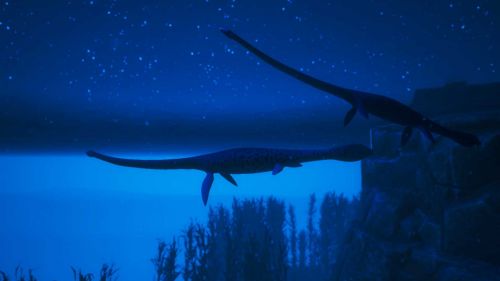Elasmosaurus

Contents
Paleo Stats
Species: E. platyurusTime Period: Cretaceous
Length: 10.3 meters (34 feet)
Weight: 2 tonnes (2.2 short tons)
Basic Information
Category: AquaticDiet: Fish, Meat
In-game Stats (Adult, Growth 1.0)
Health: 625Stamina: 135
Ability: 100
Comfort: 100
Base Food Capacity: 100
Overweight Food Capacity: 140
Oxygen Capacity: 100
Growth Rate: TBD
Weather Resistance: TBD
Can be picked up by a tornado: Yes
____________________________________________________________________
Overview
The Elasmosaurus is an aquatic creature in Beasts of Bermuda. Though it does not possess the high health and damage of the Mosasaurus or the Kronosaurus, it is currently the fastest swimmer in the game.
It is piscivorous, meaning specializes at eating fish. It can echolocate to reveal their location, as well as snatch them up with ease due to its very high attack range.
But it can always choose to follow a much more aggressive playstyle. It has the ability to choke and drown its opponents in a similarly gruesome fashion to the Mosasaurus, as well being gifted with a surprisingly versatile skill tree. It can shift into a nearly-invisible state that allows it to swim undetected, reduce a victim's oxygen to 0 in a second's worth of notice or even leap over entire landmass to access new bodies of water, allowing it a flexible gameplay full of surprises.
____________________________________________________________________
Pros and Cons
Pros:
+ Very flexible Skill Tree
+ Grows fast
+ Superb attack range and precision
+ Can echolocate for fish
+ Good fighter
+ High Speed
Cons:
- Has naturally low base health and speed
- Can die from beaching
____________________________________________________________________
Abilities
Unique Signature Attribute: The Elasmosaurus has an automatic aiming system, so it will almost always strike its targets when they are within its attack radius.
- Primary Attack: A quick bite, on par with raptors and other small creatures.
- Secondary Attack: A long-range dash that causes the Elasmosaurus to briefly rocket forwards at incredible speeds, which can be used jump out of the water (though caution is advised doing this near beaches as the Elasmosaurus can become beached). This is very similar to the Mosasaurus' secondary attack.
- Special Ability: Upon activating, the Elasmosaurus' next attack is a grab attack that can pick up creatures. The Elasmosaurus can only pick up creatures smaller than it. Pressing the primary attack button while holding a creature will cause the Elasmosaurus to thrash its victim around, dealing damage. The Elasmosaurus can continue thrashing for as long as it has ability power, which will consistently decrease as the victim is held. Creatures such as the Velociraptor are small enough to be swallowed whole by executing its secondary attack.
Unique Attribute: The Elasmosaurus can echolocate by using its short call (Default button is 2). It will highlight all nearby fish, making them much easier to spot.
____________________________________________________________________
Weakness
The Elasmosaurus is rather fragile, having relatively low HP for its size. It also starts the game as a very vulnerable creature, and like all aquatic creatures, it can die from beaching itself.
The Elasmosaurus is also susceptible to being preyed upon by the Mosasaurus and the Kronosaurus. However, The Elasmosaurus is faster and has more stamina than the two, allowing it to dodge their attacks and, if needed, defend itself by retaliating back. Nonetheless, the Elasmosaurus is still not as powerful as the other two aquatics.
____________________________________________________________________
Additional Notes
- It is currently the only creature that as an auto-aim mechanic.
- Creating the Elasmosaurus and transforming it into a practical creature for gameplay was an extremely difficult endeavor, mostly due to the programming for its neck.